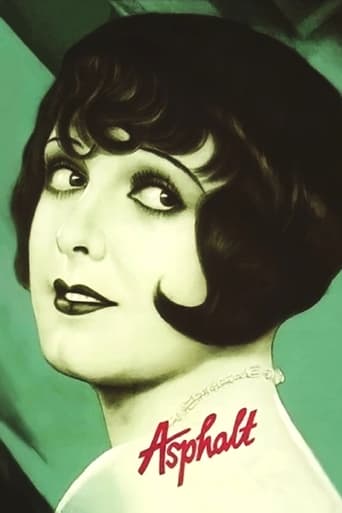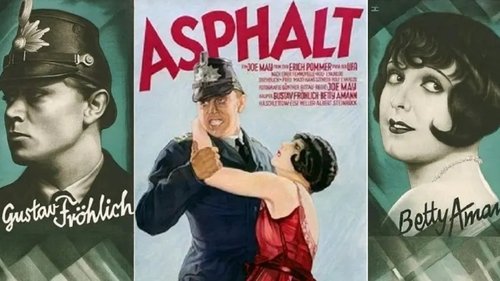Claudio Carvalho
In Berlin, the dedicated traffic officer Albert Holk (Gustav Fröhlich) is a young man that lives with his parents. When the elegant and charming Else Kramer (Betty Amann) shoplifts a diamond in the Bergen Jewelry, the officer arrests her despite the request of the owner to release the youngster after retrieving the stone. They take a cab to the police station and Else first cries and then she unsuccessfully tries to seduce the uncorrupted officer. When they are in front of the precinct, Else asks Albert to go to her house first to get her documents. The reluctant officer finally accepts her request to go to her apartment and once there, she seduces him. On the next day, Albert feels guilty for failing on his duty. Else decides to return his documents that she had stolen in the previous night with a box of cigars. When the carrier delivers the envelope to Albert, he goes to Else's apartment offended with the bribe. But sooner he succumbs to the gorgeous lady and proposes her. Else questions the future of a policeman with a thief and shows that she stole the diamond for greed and not for need. Meanwhile, Else's lover Konsul Langen (Hans Adalbert Schlettow) returns from Paris where he had heisted the safe of a bank and finds Albert and Else together in her apartment. When Konsul pushes Else on the floor, Albert defends her and himself and their fight lead to a tragic conclusion. "Asphalt" is a dramatic German silent film and an early film-noir. The gorgeous dark-haired Betty Amann is one of the most expressive actresses I have ever seen, and her eyes are amazing in the close-ups. The sequence in the taxi with the tears in her eyes is fantastic. Her performance is remarkable and her character certainly is one of the first femme fatales of the cinema history. The dilemma of Albert Holk, shared between his duty and the seductive woman, is one of the best moments of this film. This film registers the streets of Berlin in the late 20's with a great traffic of buses and automobiles and crowded streets. The music score of this highly recommended DVD is also awesome. My vote is eight.Title (Brazil): "Asfalto" ("Asphalt")
jpb58
This late German silent film, Asphalt, was incredibly fun! It's an amazing treasure and treat for the eyes (and ears: it boasts a marvelous jazz score on the DVD that is perfect for the film!). No spoken dialogue needed in Asphalt to communicate sensuality, and in fact dialogue would ruin the intensity of this incredible film. An added plus is seeing Berlin in 1929, with all its decadence before National Socialist Hitler moved in and spoiled things in 1933. Starring the adorable, funny, and sensual Betty Amann, and the handsome Gustav Fröhlich from Metropolis, Asphalt tells the story of a puritan traffic cop (Gustav) who is tempted to sin with a jewel thief (Betty). His devoted parents trust him entirely and maybe that's part of his problem: he's been pampered and treated like a pet more than a son, obviously cushioned from much unpleasantry in life. In fact the father of the cop has his own pet, a little canary in a cage, and the mother of the cop has her son for her pet! In the art of silent film the director can emphasize small things like these and keep the audience's interest perked through symbolism. In sound films there rarely seems to be time devoted to this kind of creativity. My favorite scene is the long one where the cop has arrested the jewel thief and she cries and cries and cries (with the music making moaning sounds that are hilarious) and she tries to win his sympathy. She tries every trick in her book to keep from being taken to the police station. She begs him to take her to her apartment so she can get her papers. Exasperated with her, he does so. Once there the poor cop doesn't stand a chance. The climax of that scene really stunned me. I could swear Betty Amann said the F word, though of course I could be wrong because the film is German. ;) There's a somewhat predictable ending but it's how the director, Joe May, spins it all together, with artful, passionate camera-work, that keeps you on the edge of your seat.The two leads give incredible performances, especially Betty Amann. She had even more fire and intelligence in her portrayal of the jewel thief than any performance I've seen given by Clara Bow or Louise Brooks. Her career should have been better. The only other film I've seen her in is an early Hitchcock sound film Rich and Strange (1931). Gustav Fröhlich also shows a more tender side here than in Metropolis. A marvelous late German silent that must be seen to be believed. If you haven't watched it yet you are REALLY missing out! Don't get turned off by the unromantic title. Get it today!
FerdinandVonGalitzien
The first time that this German count watched Herr Joe May's "Asphalt" was during a mad Berliner soirée; the film was a wonderful and astonishing revelation, a great film due to its modernity and impeccable technical results. At the time the name of the director was written down in the decadent silent agenda as a director who would someday become famous and indeed Herr May has passed into the film history books with such superb films as "Das Indische Grabmal" (1921) and "Heimkehr" (1928).From the very start of the film, even with the credits, Herr May's skill is established. He shows the fascinating big city and the main characters of the oeuvre ( a stylish crook, "desperate and in need", and a dutiful constable ) and skilfully uses crane shots around the streets ( MEIN GOTT!!... what an incredible and evocative atmosphere) emphasizing from that time on, the dramatic, sensual aspects of the film at once without the need of additional explanations.As happens in many Weimar silent films, social aspects ripple beneath the surface of the story ( which concerns an unscrupulous woman and her questionable life and her obscure pimp with international interests all of which escape the innocent policeman hero ). May notes the different social classes that separate Dame Elsa ( Betty Amann ) and Herr Albert Hols ( Herr Gustav Fröhlich ), elegant and decadent for Dame Else and proletarian and common for Herr Albert ( the contrast between Dame Elsa's decadent life and Herr Albert's proletarian family are carefully depicted.) These backgrounds obviously influence their conduct and "principles", not to mention the way they both face life. Their different worlds t finally will collide hopelessly but beneath it all they are, in the end, just two lonely people ( and that's one of the most important aspect of the story ), who want to connect with each other in spite of their social and even sexual inner conflicts. Duty and law will collide with human need but redemption is also part of the mix after a painful struggle."Asphalt" is outstanding for its superb direction and modernity, not to mention the gorgeous and stylish Dame Betty Amann, the unquestionable and sensual star of the film thanks to the superb and wonderful Herr Günther Rittau cinematography.And now, if you'll allow me, I must temporarily take my leave because this German Count must order one of his Teutonic heiresses to asphalt the Schloss pavement but in one of her most gorgeous costumes.Herr Graf Ferdinand Von Galitzien http://ferdinandvongalitzien.blogspot.com/
movingpicturegal
Outstanding German silent era crime drama; an early film noir about a young traffic officer who gets involved with a femme fatale he has just arrested for stealing a diamond from a jeweler's shop. This spit-curled, dark-haired beauty attempts to use tears, tricks, Cognac, a pillow-laden couch proportioned like a king-sized bed, and finally a black-laced bodysuit/nightie to seduce our officer into letting her off. These two soon become emotionally involved with each other, but the officer is feeling guilt over shirking his duty to arrest her.The photography in this film is really excellent - the film as a whole is very visual, with lots of facial close-ups, softly filtered lighting along with shadowy rooms and hallways, and an interesting montage at the beginning of the asphalt streets of Berlin and it's fast moving crowds of people and traffic, all shown with interesting overlapped and angled photography. The actors all give excellent, emotional performances. The actress, Betty Amann, who portrays the thief is especially good here, seducing both our officer and the viewer with just her eyes, showing a great range of emotion in close-up. The print on the DVD of this looks good, the orchestral score is really great and suits this to a tea. I have seen many, many silent films and I would certainly count this one among the best I've seen.






